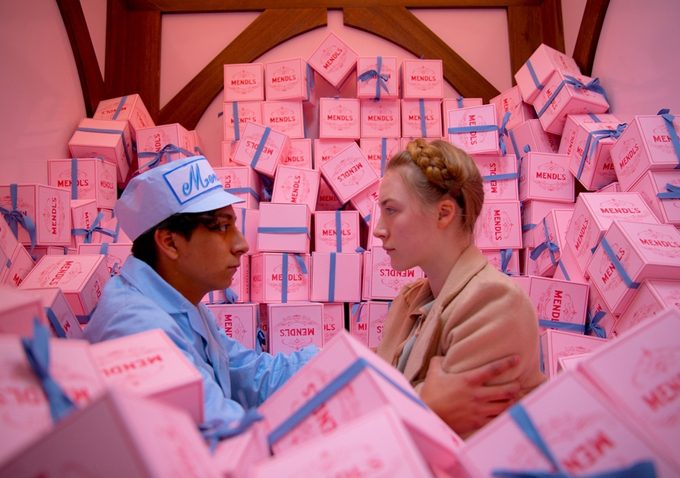‘The Grand Budapest Hotel’ worth extended stay
The Grand Budapest Hotel
March 31, 2014
Eccentric director Wes Anderson, known for “The Royal Tenenbaums” and “Moonrise Kingdom,” is one of this generation’s most recognizable talents. Through a unique visual and topical style he has made darkly comedic films and his latest, “The Grand Budapest Hotel,” is his most ambitious yet. This film, unlike most of Anderson’s previous films, appeals to a large audience and reaches beyond his usual niche.
The opening shifts back in time through several decades and narrators until it settles on an author (Jude Law) who avers that sometimes stories originate by chance. In his travels, he meets the wealthy Mr. Moustafa (F. Murray Abraham) who shares tales of his adventures over dinner with M. Gustave (Ralph Fiennes), the head concierge of The Grand Budapest Hotel where he was a lobby boy. The next temporal transition takes the viewer back to the hotel in early 1930s Europe, nested between several different countries gearing up for an upcoming coming war.
In his first major film role, Tony Revolori deftly plays Zero, the wide-eyed lobby boy mentored by M. Gustave at the title hotel, a place where wealthy people from around the world come to enjoy its lavish accommodations—but most of all to see Gustave, a man willing to do anything to please his guests.
One of the hotel’s frequent visitors, the wealthy widow Madame D., played in thick makeup by Tilda Swinton (“Moonrise Kingdom,” “Burn After Reading”), dies not long after a rendezvous with Gustave and he is accused of murder when she leaves a rare painting to him in her will. The rest of the film plays out like a classic mystery plot with a menagerie of genre stereotypes like chase scenes, evil butlers, surly gangsters and a tenacious inspector.
The film sets a brisk pace and the thematic aspects reflect Gustave’s efficiency and sophistication. The man oozes charisma and is delightfully debonair, doing whatever it takes to better the hotel he loves.
He is charming but simultaneously neurotic and self-absorbed, often seen talking to himself and sleeping with many of his elderly guests. His emotional inconsistency makes him one of the most complex and memorable characters of Anderson’s films and unlike some of the obscure and abrasive personalities in his early works such as “Bottle Rocket” and “Rushmore.” Fiennes carries the film with a panache that makes his moral depravity excusable. He was born to play Gustave, a perpetually cool playboy who, even when accused of murder, has a witty deflection ready.
The entire cast is excellent and allows the film to seamlessly switch tone when necessary. Edward Norton as Inspector Henckels and Willem Dafoe (“The Life Aquatic With Steve Zissou,” “The Boondock Saints”) as the gangster Jopling deliver some of the more amusing performances. The ease and gusto with which they embrace their characters is remarkable.
The film’s progression does not detract from Anderson’s keen attention to detail. Each scene is packed with clues about the characters who inhabit them. The concierge office, where Gustave and Zero spend most of their time, is orderly but packed to the ceiling with files and records, representing Gustave’s rich but often hectic life. Additionally, the small, dank room where Zero’s love interest Agatha (Saoirse Ronan) stays mirrors her more modest outlook on life.
As in other Anderson films, color plays an important role, but in no other has it been integrated so smoothly. Certain characters even don specific shades to illustrate their attitudes and motivations. Gustave in particular often dresses in the pink or purple hues that animate his hotel. The film’s main antagonist, the late widow’s son Dmitri (Adrien Brody), wears exclusively black and gray, as do his henchmen. The film is told through the memories of someone who held the hotel in high esteem, and the colors and characters have an exaggerated, cartoon-like quality making them exquisitely memorable.
The dialogue is sharp, quick and masterfully delivered—Anderson knows when to let his characters speak and when to let their gestures do the talking. Gustave and the supporting cast have plenty of one-liners, but what is more likely to make viewers erupt in laughter are the subtle facial expressions, or conspicuous smirks that are out of place in seemingly serious scenes.
Anderson should no longer be described as a “quirky” or “niche” director. In “The Grand Budapest Hotel,” he has learned how to use production elements to create special works, not just another oddity.








